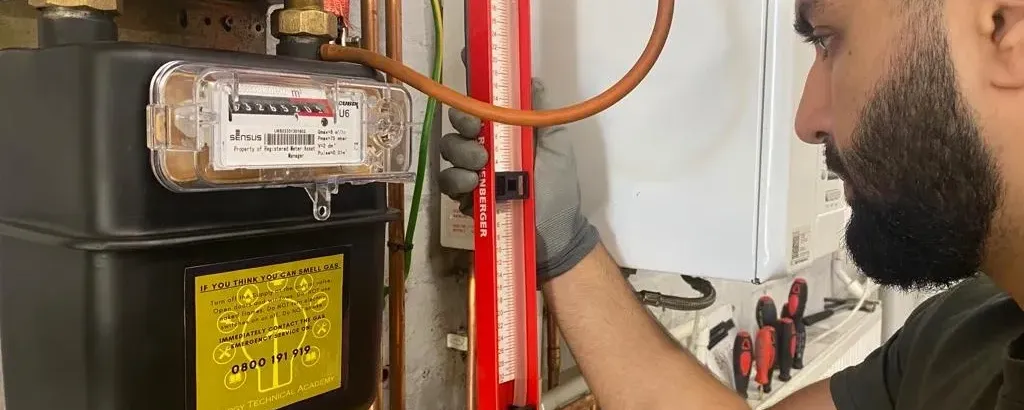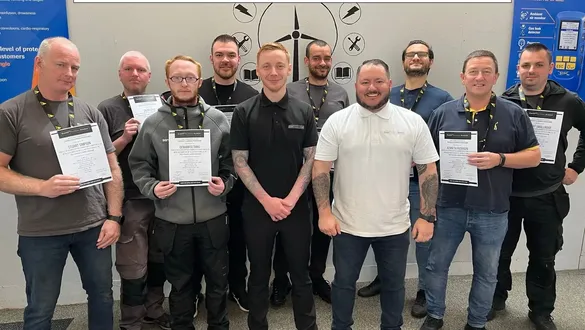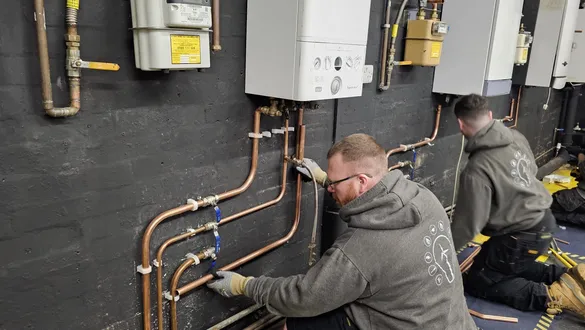
Group Gas Safety Fundamentals: What Every Trainee Should Know
19th Dec.
Gas safety is a cornerstone of the energy sector, ensuring the safe use of natural gas in residential, commercial, and industrial settings. For trainees entering the field, understanding the fundamentals of gas safety is essential—not just to pass qualifications, but to protect lives, property, and the environment.
At ETAG, we believe in equipping trainees with the knowledge and skills they need to excel in their careers. Here’s a guide to the key gas safety principles every aspiring gas professional should know.
Why Gas Safety Matters
Gas is an efficient and widely used energy source, but improper handling can lead to severe consequences, including:
- Fires and Explosions: Leaking gas can ignite, causing significant damage.
- Carbon Monoxide Poisoning: Faulty appliances or poor ventilation can produce this deadly, odorless gas.
- Environmental Impact: Leaks contribute to greenhouse gas emissions, impacting the planet.
Understanding and adhering to safety standards minimizes these risks and ensures public confidence in the industry.
Key Gas Safety Fundamentals for Trainees
Know the Properties of Gas
- Familiarity with the physical and chemical properties of gas is the foundation of gas safety. Key characteristics include:
- Flammability: Gas is highly combustible when mixed with air in specific proportions.
- Odor: While natural gas is odorless, mercaptan is added to give it a distinctive smell, aiding leak detection.
- Density: Natural gas is lighter than air, while liquefied petroleum gas (LPG) is heavier and can accumulate at ground level.
Understand Gas Regulations and Standards
- Trainees must be well-versed in the regulations governing gas safety. In the UK, these include:
- Gas Safety (Installation and Use) Regulations 1998: Outlines the legal duties of gas engineers and property owners.
- Gas Safe Register: The official register for qualified gas engineers; trainees must work under supervision until they achieve certification.
Compliance with these standards ensures safety and legal accountability.
Master the Use of Tools and Equipment
- Gas engineers rely on a variety of tools to carry out their work safely and effectively, including:
- Gas Detectors: Used to identify leaks.
- Manometer*: Measure gas pressure in pipes.
- Combustion Analyzers**: Ensure appliances are burning fuel efficiently and safely.
Trainees should learn to use and maintain these tools with precision.
Understand Ventilation and Combustion Principles
Proper ventilation is critical to safe gas use. Trainees must understand:
- Air Supply: Adequate oxygen is necessary for complete combustion.
- Flue System*: These safely expel combustion by-products like carbon monoxide.
- Signs of Poor Combustion: Yellow flames, soot, or condensation are indicators of unsafe conditions.
Learn Leak Detection and Emergency Procedures
- Gas leaks are among the most dangerous risks in the field. Trainees must know:
- How to Detect Leaks: Recognizing the smell of gas, using detection equipment, and monitoring pressure drops.
- Emergency Response: Turning off the gas supply, evacuating the area, and contacting emergency services.
Be Proficient in Appliance Servicing and Testing
- Routine servicing is essential to ensure the safety and efficiency of gas appliances. Key skills include:
- Inspecting and Cleaning Burners.
- Testing Safety Devices: Ensuring components like thermocouples are functioning.
- Conducting Tightness Tests: Verifying there are no leaks in the gas system.
Continuous Learning
- The energy sector is constantly evolving, with new technologies and regulations emerging regularly. To stay competent and compliant, trainees should:
- Attend Refresher Courses: Keep up with the latest safety standards.
- Follow Industry Developments: Understand how innovations like hydrogen blending impact gas safety.
How ETAG prepares trainees
- At Energy Technical Academy, we provide comprehensive training to help you master gas safety fundamentals. Our courses combine:
- Classroom Learning: Covering theoretical knowledge of gas properties, regulations, and best practices.
- Practical Workshops: Hands-on experience with tools, appliances, and real-world scenarios.
- Expert Guidance: Learn from experienced instructors who bring decades of field knowledge.
Why Gas Safety Is Your First Priority
As a trainee, mastering gas safety isn’t just about passing your exams—it’s about becoming a trusted professional who prioritizes the well-being of clients and communities. By committing to excellence and staying vigilant, you’ll play a vital role in maintaining the integrity of the energy sector.
Start Your Career with Confidence
If you’re ready to take the first step toward a rewarding career in the energy industry, enroll in our Gas Training Course at ETAG. Together, we’ll build your skills, confidence, and understanding of gas safety fundamentals.
Contact us today to learn more about our courses and how we can help you succeed in the gas industry.
Your future in the energy sector can start with safety today.
Recommended Courses
Trainee Gas Engineer Course (Full Time)
This course is suitable for anyone aged 16 or over looking to start a career in the gas industry. It's aimed at those with no prior experience or qualifications in the industry looking to embark on a new career path by building a solid understanding of the core principles of gas safety.
Installation and Maintenance of Air Source Heat Pumps
This course is frequently combined with our WRAS Water Regulations and HWSS courses to offer a complete package to get up to speed on all aspects of Air Source Heat Pump installation, commissioning, maintenance and repair.
Trainee Gas and Renewables Engineer Course (Part Time)
This course is suitable for anyone aged 16 or over looking to start a career in the gas industry. It's aimed at those with no prior experience or qualifications in the industry looking to embark on a new career path by building a solid understanding of the core principles of gas safety.

